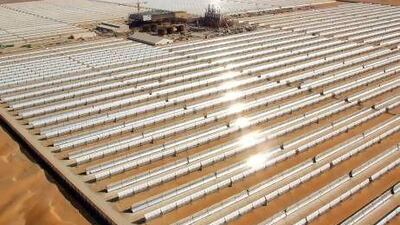DUBAI // The country’s solar-power industry is progressing but it will be a decade before it catches up with leading countries, experts say.
While most respondents to a survey expected moderate growth in the UAE’s solar industry in the next five years, more than 60 per cent expected that in a decade the industry become a major player in the region.
“This is where it [solar] becomes so attractive that you will have not one or two projects at a time, but as many as 15 major projects at the same time,” said Hannes Reinisch, a senior manager at PricewaterhouseCoopers, who presented the findings to the Solar Industry Summit in Dubai yesterday.
The survey, by the Emirates Solar Industry Association (Esia) and PricewaterhouseCoopers, collected feedback from 170 industry figures in the first half of the year.
The UAE is a latecomer to the industry compared with countries such as Spain and Germany.
So far, Abu Dhabi and Dubai have been following “a step-by-step process” in adopting solar capacity, said Mr Reinisch.
In 2009, the Abu Dhabi clean-energy company Masdar connected a 10-megawatt solar-photovoltaic plant into the capital’s power grid.
This year Shams 1, a power plant with a capacity of 100MW of electricity – enough to power 20,000 homes – will also start work, while Dubai has recently started building a 13MW plant.
But more projects are needed for solar power to become a substantial part of the country’s energy mix.
“In the Middle East things are slower to get established,” said Vahid Fotuhi, president of Esia.
“You need more time to establish frameworks, policies and a regulatory regime. As authorities start doing this, you will see solar technologies take root and grow.”
Mr Fotuhi said he was optimistic that Abu Dhabi and Dubai would adopt policies and legal frameworks for renewable energy.
This, along with efficient regulatory bodies and special tariffs for clean energy, were mentioned by most respondents as factors needed to support the industry.
“I am happy to say there are discussions and progress is being made and key government authorities in charge of this are working,” Mr Fotuhi said.
“This is happening now both in Dubai and Abu Dhabi.
"I am confident that by the next edition of this conference, we will see policies being introduced that allow for the growth of solar power.”
The new policies are expected to encourage small-scale installations on rooftops and other areas within cities.
Abu Dhabi and Dubai have previously referred to such schemes.
In July this year, Waleed Salman, chairman of the Dubai Carbon Centre, said Dubai planned to create “not less than 800MW” this way by 2030.
Yesterday, Taher Diab, director of strategy and planning at the Dubai Supreme Council of Energy, said the emirate was also working towards introducing better tariffs for clean-energy producers.
A draft document, outlining such tariffs in Dubai, is completed and about to be submitted to the Executive Council for approval, Mr Diab said.

